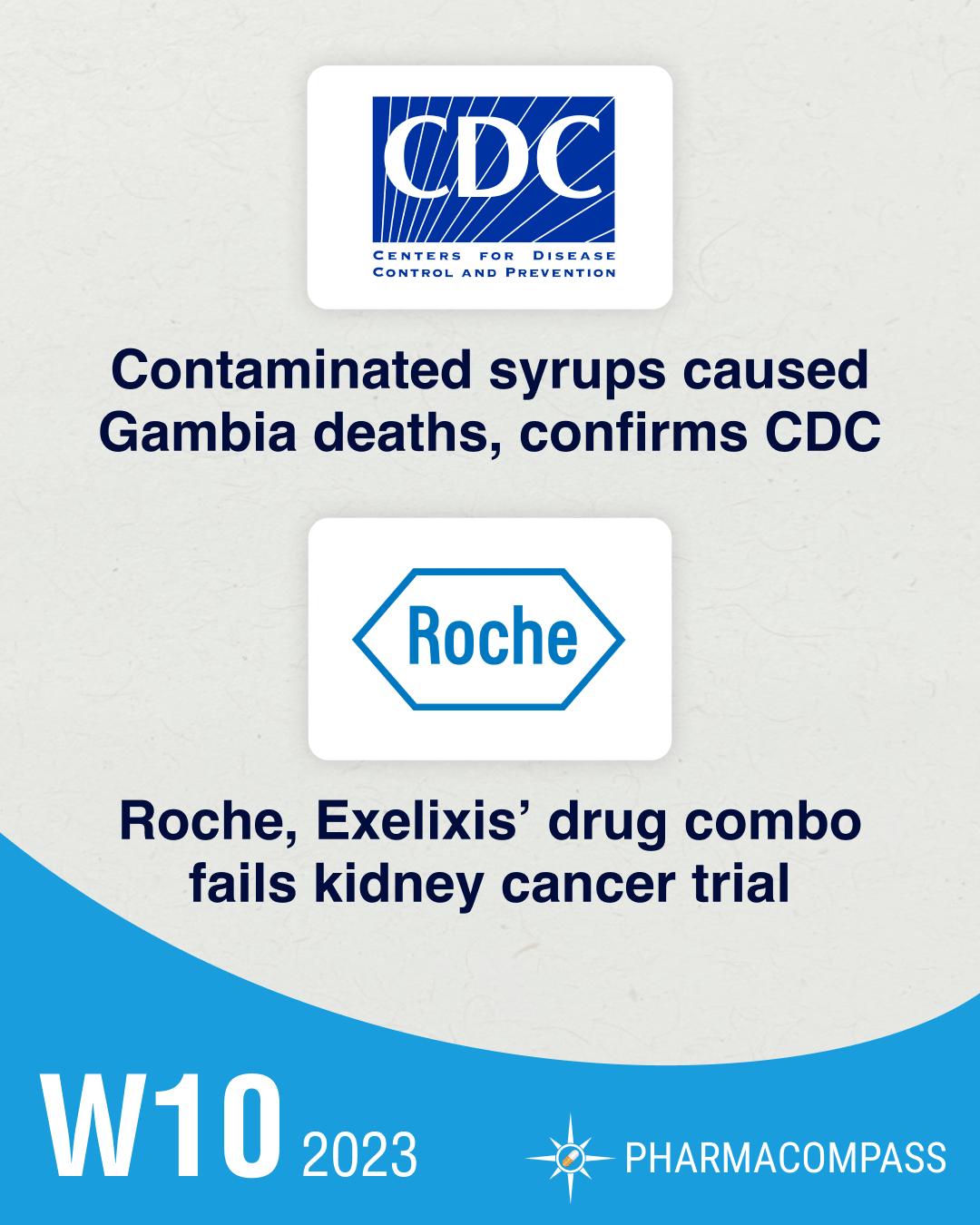
By PharmaCompass
2023-03-09
Impressions: 1,084
An investigation by the US Center for Disease Control and Prevention (CDC) and Gambian scientists has concluded that contaminated cough and paracetamol syrups imported into Gambia caused the deaths of 70 children due to acute kidney injury. The Indian government has arrested three officials of Marion Biotech after tests in a government laboratory found 22 of 36 syrup samples “adulterated and spurious.”
A combination of Exelixis’ cancer drug Cabometyx and Roche’s immunotherapy Tecentriq has failed another late-stage trial, this time in kidney cancer. And Incyte has decided to terminate a phase 3 trial of its experimental oral cancer drug parsaclisib for the treatment of myelofibrosis, a rare type of blood cancer.
AstraZeneca and its partner Daiichi Sankyo have announced positive results from a mid-stage trial of their blockbuster cancer drug Enhertu in multiple HER2-expressing advanced solid tumors. The US Food and Drug Administration (FDA) has convened a meeting of its panel of external experts on April 28 to discuss the use of Lynparza (olaparib) as a treatment for patients with metastatic castration-resistant prostate cancer (mCRPC).
Covis Pharma, manufacturer of the controversial preterm birth drug Makena, has decided to withdraw the treatment in order to end its tussle with the FDA. And in the UK, Viatris has warned it will stop selling some essential medicines if the government does not amend its voluntary pricing agreement.
CDC probe confirms contaminated cough syrups led to 70 child deaths in Gambia
An investigation by the US CDC and Gambian scientists has concluded that contaminated cough and paracetamol syrups imported into Gambia caused the deaths of 70 children due to acute kidney injury. According to the joint probe report, there was a strong link between these deaths and the consumption of made-in-India cough syrups that were allegedly contaminated.
In October, the World Health Organization had linked the deaths to four cough syrups made by India’s Maiden Pharmaceuticals. The UN agency had claimed that the syrups were found to contain toxic levels of diethylene and ethylene glycol.
The CDC report, published in The New England Journal of Medicine, concluded that the wide geographic spread of the cases, and the fact that the illness did not spread to adults pointed towards a toxin rather than an infectious agent.
Meanwhile, an FDA inspection report on Teva’s manufacturing site in New Jersey has revealed issues with both equipment cleaning and quality, Endpoint News has said. Inspectors noted the buildup of “unknown residue” within two production rooms that had been documented as cleaned. A pink- or red-colored residue was found on equipment in the mixing room that had most recently been used to manufacture Cefadroxil tablets, used to treat bacterial infections.
India arrests 3 Marion officials for Uzbekistan deaths: The Indian government has arrested three officials of Marion Biotech and is looking for two directors after tests in a government laboratory found 22 of 36 syrup samples “adulterated and spurious.” In December, the Uzbek government had alleged that contaminated cough syrup made by Marion had led to the deaths of 19 children.
Roche, Exelixis’ drug combo fails second phase 3 trial, this time in kidney cancer
In December, a phase 3 trial testing the combination of Exelixis’ cancer drug Cabometyx and Roche’s immunotherapy Tecentriq had failed to meet its primary endpoint in lung cancer. Now, the same drug combination has failed another late-stage trial, this time in kidney cancer. The trial showed that the combo did not improve progression-free survival compared to Cabometyx alone in patients with advanced renal cell carcinoma who had undergone checkpoint therapy. The results from a third trial of the drug combination in metastatic castration resistant prostate cancer (mCRPC) are expected to be released later this year.
Meanwhile, FDA has convened a meeting of its panel of external experts later this week to review Roche’s application for its antibody-drug conjugate Polivy as a treatment for patients with diffuse large B-cell lymphoma (DLBCL) who have not had prior treatment.
And, Incyte has decided to terminate a phase 3 trial of its experimental oral cancer drug parsaclisib for the treatment of myelofibrosis (a rare and chronic form of blood cancer) after an interim analysis found the drug was unlikely to achieve the primary endpoint of the study.
Astra’s Enhertu shows positive results in mid-stage trial for multiple solid tumors
AstraZeneca and its partner Daiichi Sankyo have announced positive results from a mid-stage trial of their blockbuster cancer drug Enhertu in multiple HER2-expressing advanced solid tumors. The phase 2 study evaluated the safety and effectiveness of Enhertu in patients who are not eligible for curative therapy with locally advanced or metastatic previously treated solid tumors, including those of the biliary tract, bladder, cervical, endometrial, ovarian, pancreatic and rare tumors.
FDA panel to review Lynparza for prostate cancer: FDA has convened a meeting of its panel of external experts on April 28 to discuss AstraZeneca and Merck’s application for the use of Lynparza (olaparib) as a treatment for metastatic castration-resistant prostate cancer (mCRPC). A positive recommendation could make Lynparza the first PARP inhibitor to be used as a first-line treatment for men with mCRPC in the US. The drug is already approved for use in the EU.
Extends review of BioMarin’s hemophilia gene therapy: FDA has extended the review process for BioMarin’s experimental hemophilia A gene therapy Roctavian by three months, citing the need for more time to evaluate data from the company’s ongoing late-stage study, which was submitted earlier this year. The agency will now make its decision by June 30. If approved, the one-time treatment will be the first gene therapy for hemophilia A, a genetic bleeding disorder.
Meanwhile, Eisai and Biogen’s Alzheimer’s treatment lecanemab has been granted FDA’s priority review status for traditional approval. Lecanemab had received accelerated approval from the agency earlier this year.
After AbbVie and Lilly, Viatris voices opposition to UK’s voluntary drug pricing plan
In January, AbbVie and Eli Lilly withdrew from the UK’s Voluntary Scheme for Branded Medicines Pricing and Access (VPAS) due to the increased repayment rates. The scheme aims to reduce drug costs for the National Health Service (NHS) by capping annual price increases at 2 percent. It requires drugmakers to reimburse any sales that exceed certain thresholds.
And now, Viatris has warned it will stop selling some essential medicines in the UK that are already in short supply unless the government amends VPAS.
With healthcare costs rising during the pandemic, the “voluntary” payback rate jumped to 26.5 percent this year from an initial 5 percent in 2019 when the scheme was formed. Viatris expects to pay the UK government £60 million (US$ 71.62 million) this year under this scheme.
Covis Pharma ends tussle with FDA by taking back controversial preterm birth drug
Covis Pharma, maker of the controversial preterm birth drug known as Makena, has decided to withdraw the hormonal treatment in order to bring an end to its lengthy debate with the FDA, the drugmaker said in a letter. In a public hearing held in October, the Center for Drug Evaluation and Research had proposed the withdrawal of Makena.
“While we stand by Makena’s favorable benefit-risk profile, including its efficacy in women at highest risk of preterm birth, we are seeking to voluntarily withdraw the product and work with the FDA to effectuate an orderly wind-down,” said Raghav Chari, chief innovation officer at Covis.The PharmaCompass Newsletter – Sign Up, Stay Ahead
Feedback, help us to improve. Click here
Image Credit : Phisper Infographic by PharmaCompass license under CC BY 2.0
“ The article is based on the information available in public and which the author believes to be true. The author is not disseminating any information, which the author believes or knows, is confidential or in conflict with the privacy of any person. The views expressed or information supplied through this article is mere opinion and observation of the author. The author does not intend to defame, insult or, cause loss or damage to anyone, in any manner, through this article.”








